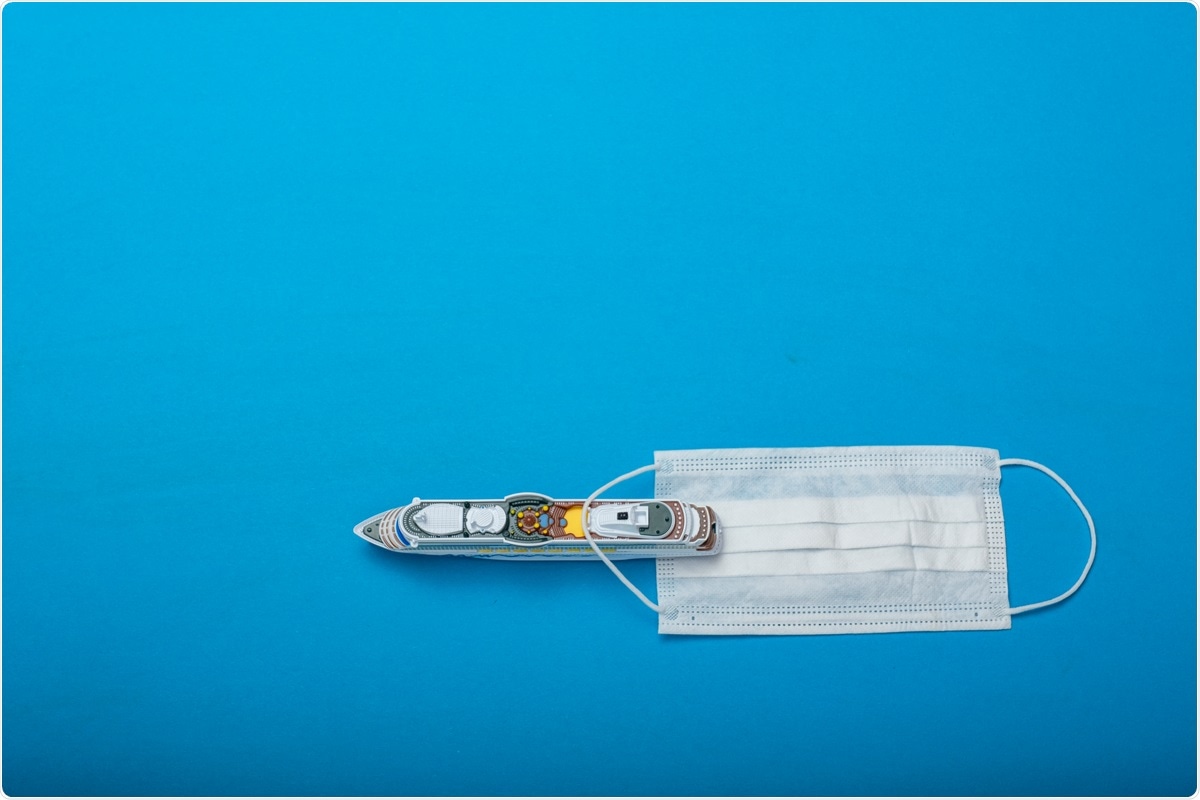Coronavirus disease 2019 (COVID-19) has caused over 4.9 million deaths and lead to worldwide economic crises. The disease spreads rapidly, typically through droplet transmission from or contact with an infected individual. COVID-19 is primarily spread through droplets between 5 and 10um in diameter, released when an infective individual coughs, sneezes, breathes, or talks.
 Study: Transmission of SARS-CoV-2 associated with cruise ship travel: protocol for a systematic review (Version 1). Image Credit: MikhailBerkut/ Shutterstock
Study: Transmission of SARS-CoV-2 associated with cruise ship travel: protocol for a systematic review (Version 1). Image Credit: MikhailBerkut/ Shutterstock

 This news article was a review of a preliminary scientific report that had not undergone peer-review at the time of publication. Since its initial publication, the scientific report has now been peer reviewed and accepted for publication in a Scientific Journal. Links to the preliminary and peer-reviewed reports are available in the Sources section at the bottom of this article. View Sources
This news article was a review of a preliminary scientific report that had not undergone peer-review at the time of publication. Since its initial publication, the scientific report has now been peer reviewed and accepted for publication in a Scientific Journal. Links to the preliminary and peer-reviewed reports are available in the Sources section at the bottom of this article. View Sources
The droplets can remain in the air for long periods and easily cover over 1m distance. Therefore, staying near an infected individual is one of the more significant risk factors for contracting the disease. This is a large portion of the reason why cruise ships, among other boat travel, are known as hotbeds for transmission, and there were several well-publicized cases of significant outbreaks. The Diamond Princess had over 700 cases aboard, one of the most well-known, and nine people died. In many cases, these ships were quarantined in foreign ports, and many individuals waited months to be repatriated as countries limited flights.
Researchers from the University of Oxford and the Victor Babes University of Medicine and Pharmacy have collaborated to create a plan to provide a comprehensive summary of data from cruise ship outbreaks and explore models of transmission at sea.
A preprint version of the group’s study is available on the medRxiv* server while the article undergoes peer review.
The study
The researchers plan to search through electronic databases for papers relevant to outbreaks of COVID-19 on cruise ships, examining as many papers as possible for data on transmission modes. They will include observational studies, case studies, randomized trials, clinical reports, outbreak reports, experimental studies, and non-predictive modeling.
Any studies that assess transmission factors, such as index case infectivity, passenger susceptibility, the effectiveness of exposure, and vaccination status. In the case of multiple studies presenting the same data, the researchers will only include the more comprehensive paper. However, if they are equally comprehensive, the highest quality or most recent will be chosen.
They will include as many details as possible in their review, including publication details, ship specifications, details on the index cases for each outbreak, whether masks were worn or not, symptoms of infected individuals, and conclusion of a transmission, amongst many others.
One author will extract the data, which a second author will check. If the authors disagree, the arbitration will be provided by a third author. Study quality will be assessed by a QUADAS-2 tool using five domains.
For transmission-based studies, the authors will investigate the setting, demographic characteristics and sampling procedures, follow-up strategy once the outbreak was discovered, the success of that strategy, the secondary cases demographic and clinical cases, and any main biases that show threats to validity. For environmental studies, the authors will investigate the description of the methods, description of the sample source, any biases, the analysis and reporting, and any applicability concerns.
Information about the transmission routes taken and the effectiveness of the response to infection could be key to discovering methods to preventing further outbreaks and providing the best possible care if they do occur. As well as this, constant monitoring and reviews of scientific papers help maintain high quality and identify lower-quality papers published in predatory journals – many of which can be used to present misinformation, which is often seen in the anti-vaccination movements, or in supporting the use of ivermectin.

 This news article was a review of a preliminary scientific report that had not undergone peer-review at the time of publication. Since its initial publication, the scientific report has now been peer reviewed and accepted for publication in a Scientific Journal. Links to the preliminary and peer-reviewed reports are available in the Sources section at the bottom of this article. View Sources
This news article was a review of a preliminary scientific report that had not undergone peer-review at the time of publication. Since its initial publication, the scientific report has now been peer reviewed and accepted for publication in a Scientific Journal. Links to the preliminary and peer-reviewed reports are available in the Sources section at the bottom of this article. View Sources
Journal references:
- Preliminary scientific report.
Cecilia, R. et al., (2021) Transmission of SARS-CoV-2 associated with cruise ship travel: protocol for a systematic review (Version 1). medRxiv. doi: https://doi.org/10.1101/2021.10.11.21264724
- Peer reviewed and published scientific report.
Rosca, Elena Cecilia, Carl Heneghan, Elizabeth A. Spencer, Jon Brassey, Annette Plüddemann, Igho J. Onakpoya, David Evans, John M. Conly, and Tom Jefferson. 2022. “Transmission of SARS-CoV-2 Associated with Cruise Ship Travel: A Systematic Review.” Tropical Medicine and Infectious Disease 7 (10): 290. doi.org/10.3390/tropicalmed7100290. https://www.mdpi.com/2414-6366/7/10/290.